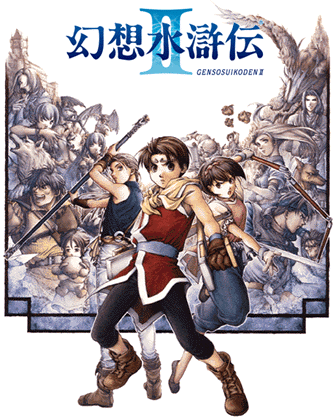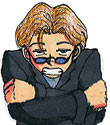Suikoden II

Plot - 9
Characters - 8
Music - 10
Graphics - 9
Battle System - 10
Replay - 10
Extra - 10
Overall - 9
Plot -
Suikoden II takes place three years after the original game, this time with
the City-State of Jowston and Highland as its focusing countries. The hero
of this game is the adopted grandson of Genkaku, who is dead by the start
of the game. You, along with your best friend Jowy, are part of the Youth
section of the Highland army. In the beginning of the game, it seems that
the war with Jowston is over. Your Youth Brigade, however, is ambushed one
night, and you and Jowy flee to safety. You wake up in the City-State, where
your importance is soon to be realized, and your destiny is just awakening.
You pick up a True Rune and your own army on the way to fulfilling your destiny,
too. And guess what -- you’re even younger than the hero in Suikoden.
Spiffy, ne? This category recieved a 9 because the plot is vaguely similar
to the first (little boy with true rune must lead an army and beat up the
bad guys) and also because, at certain points, the game is predictable. Other
than that, this is one of my favorite RPGs of all time. It really is a great
game.
Characters -
Having 108 playable characters and then many NPCs doesn’t stop this
game from getting a good score in this category. Each character has at least
some part of a history, while many, especially returning characters, have
fully-developed personalities and histories that are either revealed through
the plot line or from talking to them. There is also a character who will
go and research all of the others, giving you brief snatches of them, including
their role within the army. You get to know and love your characters (or
in some cases, utterly despise [*coughcoughMILLIEcough*]). I just wish you
could learn a little more about some of your villains. There is a lot of
information about them, but not all of it you can find out within the game.
The characters are pretty cool, though.
Music -
The music in this game is pretty amazing. It’s all so expressive and
fitting to the situation. Wow. There’s not much to say, other than
it’s incredible. It deserves the ten it got. If you don’t believe
me, download a few songs and hear for yourself. I’d recommend the opening,
Retrospection, Two Rivers, Annallee’s song, Theme of Sadness, or Beautiful
Morning. This is only a fraction of the game’s good music, though.
Graphics -
If you prefer pixelated games to 3D ones, you’ll love the graphics in
this game. The characters all have a slightly chibi-looking style to them,
and are really cute. The movements are really fluid, also. The sprites are
slightly taller than those of the early Final Fantasies, so you can actually
pick out details on them. Every now and then there will be a FMV as well.
These are pretty cool looking, but almost feel out-of-place in the game.
They’re still fun to watch, though. The only really awful graphics are
in the one-on-one battles, when you’re spinning around.
Note - If you get really bored while playing one day, go to the world map and watch the clouds. I swear, one of the clouds looks like a Chocobo.
Battle Systems -
There are three different types of battles that go on in Suikoden II. The
first of these is the normal battle. These are the battles you fight regularly,
on the world map or in dungeons. You fight with all six members of your party,
and can perform unite attacks, spells with your runes, or just basic attacks.
Sometimes you’ll do a critical hit, or will attack in a sequence. This
is normally only two times in a row, but I’ve gotten up to four before,
five if you count having the double beat rune on a character.
The second type of battle is a one-on-one battle. This is a battle with your main character versus another. There are three options: Attack, defend, and wild attack. Attack does a normal amount of damage, and can’t really be stopped. Damage only goes down when defended against. Defend, when used against wild attack, will make you completely dodge the attack and counterattack. Wild attack does a lot of damage, unless defended against. Look to what your enemy says to determine which of the three choices you should go with.
The last style of battle is the army battle. You have units led by some of your 108 stars, which you can arrange. Some characters have special abilities to help you in battle. You can chose either a certain special ability, attack, or defense. You can only attack while next to an enemy unit, though. When you engage in a unit battle, you don’t have any control over what happens. Each side will go and attack each other, going from one side of the screen to another. If you’ve killed enough people, you’ll do one point of damage to the enemy, which will appear as a sword through them on the main screen. When you get two swords, your unit is defeated and must leave the battle. You’ll know when you kill enough people to do one point of damage. Each battle has a different goal to win. One would be either to kill one specific unit, while others are to kill them all. Although not as fun as watching the army battles in Suikoden, this is a really good system, which you have more control over.
Replay -
This is a game you’ll want to play over and over. It’s a good game
to play if you get bored one weekend, because once you’ve beaten it
before you can usually zip through and finish pretty quickly. If you take
your time and do all of the extra things, though, it can last for a while.
This is especially true if you try to get all 108 stars, which can be a pretty
daunting task.
Extras -
This game is full of extra things you can do to waste time. There are a bunch
of mini-games. In one of them, you have to climb a rope up a mountain. You
“roll the dice” to see how many knots you go up. If you roll a
one, you go back down to the last knot you marked. You need to mark your
spot every so often just in case.
Another thing you can do is fish. You do this either for money, fun, or to use for cooking. It’s pretty easy.
Also, you can play whack-a-mole. Mwaha, this game is really addictive.
Throughout the game, you find seeds and animals you can buy or randomly get. You raise your own livestock, eventually, and can grow your own garden. The things you raise can also be used for cooking.
Returning from the first game is Chinchirorin, the dice game. This is too complicated for me to really explain here, so I’ll let you just experience it for yourself. It’s necessary to play in order for the story to progress at one point.
Now, probably the most loved of the side-games, the cook offs. Once you get your chef, you can randomly do cooking contests against them. Depending upon what recipes you’ve gotten so far, you can make a large variety of food. You need to make an appetizer, main course and dessert. Each character that serves as a judge likes different kinds of food, and you need to determine what they like best from their introduction. You’re judged on a scale of one to five points. You usually receive a new recipe for winning.
There is also a side-quest involving Clive, from the first game, and a woman named Elza. This is extremely hard, though, and you definitely don’t want to attempt it your first time through the game.
These are only a few of the extra things this game has to offer.
Overall, Suikoden II is definitely a great game, worth checking out.
Crystal Zeal's Reviews
Suikoden 2 Reviews
This Page © Copyright 1997, Brian Work. All rights reserved. Thanks to Sax for his help with the layout. Do not take anything from this page without my consent. If you wish to contact an author, artist, reviewer, or any other contributor to the site, their email address can be found on their index page. This site is link-free, meaning you don't need to ask me if you'd like to link to it. Best viewed in 1024x768.

